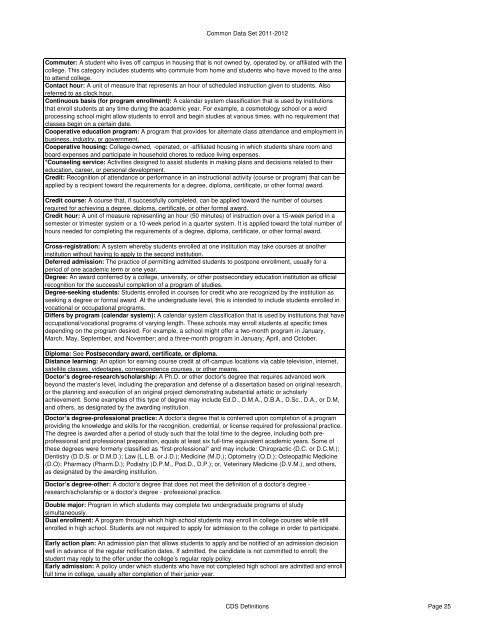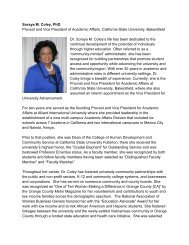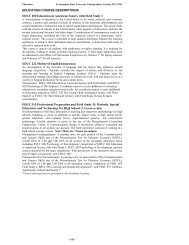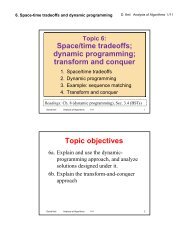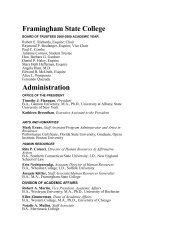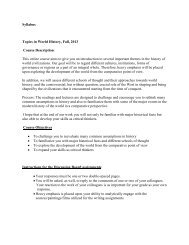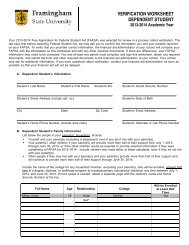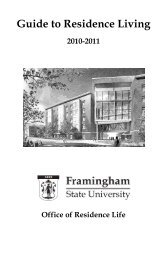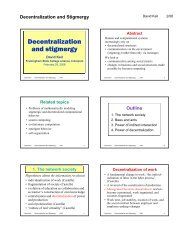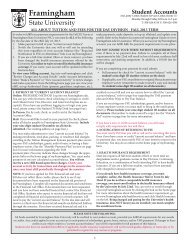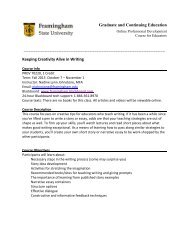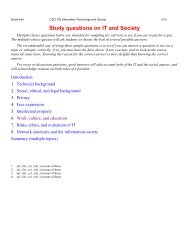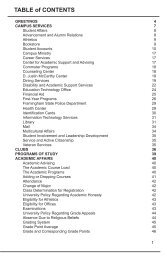2011-2012 Common Data Set - Framingham State University
2011-2012 Common Data Set - Framingham State University
2011-2012 Common Data Set - Framingham State University
Create successful ePaper yourself
Turn your PDF publications into a flip-book with our unique Google optimized e-Paper software.
<strong>Common</strong> <strong>Data</strong> <strong>Set</strong> <strong>2011</strong>-<strong>2012</strong><br />
Commuter: A student who lives off campus in housing that is not owned by, operated by, or affiliated with the<br />
college. This category includes students who commute from home and students who have moved to the area<br />
to attend college.<br />
Contact hour: A unit of measure that represents an hour of scheduled instruction given to students. Also<br />
referred to as clock hour.<br />
Continuous basis (for program enrollment): A calendar system classification that is used by institutions<br />
that enroll students at any time during the academic year. For example, a cosmetology school or a word<br />
processing school might allow students to enroll and begin studies at various times, with no requirement that<br />
classes begin on a certain date.<br />
Cooperative education program: A program that provides for alternate class attendance and employment in<br />
business, industry, or government.<br />
Cooperative housing: College-owned, -operated, or -affiliated housing in which students share room and<br />
board expenses and participate in household chores to reduce living expenses.<br />
*Counseling service: Activities designed to assist students in making plans and decisions related to their<br />
education, career, or personal development.<br />
Credit: Recognition of attendance or performance in an instructional activity (course or program) that can be<br />
applied by a recipient toward the requirements for a degree, diploma, certificate, or other formal award.<br />
Credit course: A course that, if successfully completed, can be applied toward the number of courses<br />
required for achieving a degree, diploma, certificate, or other formal award.<br />
Credit hour: A unit of measure representing an hour (50 minutes) of instruction over a 15-week period in a<br />
semester or trimester system or a 10-week period in a quarter system. It is applied toward the total number of<br />
hours needed for completing the requirements of a degree, diploma, certificate, or other formal award.<br />
Cross-registration: A system whereby students enrolled at one institution may take courses at another<br />
institution without having to apply to the second institution.<br />
Deferred admission: The practice of permitting admitted students to postpone enrollment, usually for a<br />
period of one academic term or one year.<br />
Degree: An award conferred by a college, university, or other postsecondary education institution as official<br />
recognition for the successful completion of a program of studies.<br />
Degree-seeking students: Students enrolled in courses for credit who are recognized by the institution as<br />
seeking a degree or formal award. At the undergraduate level, this is intended to include students enrolled in<br />
vocational or occupational programs.<br />
Differs by program (calendar system): A calendar system classification that is used by institutions that have<br />
occupational/vocational programs of varying length. These schools may enroll students at specific times<br />
depending on the program desired. For example, a school might offer a two-month program in January,<br />
March, May, September, and November; and a three-month program in January, April, and October.<br />
Diploma: See Postsecondary award, certificate, or diploma.<br />
Distance learning: An option for earning course credit at off-campus locations via cable television, internet,<br />
satellite classes, videotapes, correspondence courses, or other means.<br />
Doctor’s degree-research/scholarship: A Ph.D. or other doctor's degree that requires advanced work<br />
beyond the master’s level, including the preparation and defense of a dissertation based on original research,<br />
or the planning and execution of an original project demonstrating substantial artistic or scholarly<br />
achievement. Some examples of this type of degree may include Ed.D., D.M.A., D.B.A., D.Sc., D.A., or D.M,<br />
and others, as designated by the awarding institution.<br />
Doctor’s degree-professional practice: A doctor’s degree that is conferred upon completion of a program<br />
providing the knowledge and skills for the recognition, credential, or license required for professional practice.<br />
The degree is awarded after a period of study such that the total time to the degree, including both preprofessional<br />
and professional preparation, equals at least six full-time equivalent academic years. Some of<br />
these degrees were formerly classified as “first-professional” and may include: Chiropractic (D.C. or D.C.M.);<br />
Dentistry (D.D.S. or D.M.D.); Law (L.L.B. or J.D.); Medicine (M.D.); Optometry (O.D.); Osteopathic Medicine<br />
(D.O); Pharmacy (Pharm.D.); Podiatry (D.P.M., Pod.D., D.P.); or, Veterinary Medicine (D.V.M.), and others,<br />
as designated by the awarding institution.<br />
Doctor’s degree-other: A doctor’s degree that does not meet the definition of a doctor’s degree -<br />
research/scholarship or a doctor’s degree - professional practice.<br />
Double major: Program in which students may complete two undergraduate programs of study<br />
simultaneously.<br />
Dual enrollment: A program through which high school students may enroll in college courses while still<br />
enrolled in high school. Students are not required to apply for admission to the college in order to participate.<br />
Early action plan: An admission plan that allows students to apply and be notified of an admission decision<br />
well in advance of the regular notification dates. If admitted, the candidate is not committed to enroll; the<br />
student may reply to the offer under the college’s regular reply policy.<br />
Early admission: A policy under which students who have not completed high school are admitted and enroll<br />
full time in college, usually after completion of their junior year.<br />
CDS Definitions Page 25


